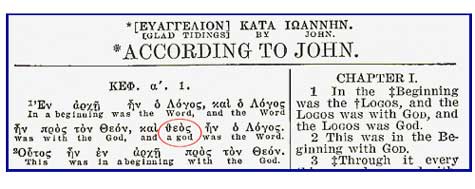A common charge made against the New World Translation of the Holy Scriptures is that it is the *only* bible to translate John 1:1c as “the Word was a god” due to some sort of anti-trinitarian bias. However, this is incorrect, as other translators, including known trinitarians, have seen something in the Greek grammar and context of the first chapter of John that made them render John 1:1 different from the traditional rendering “and the Word was God”. Here are some examples…
-
- 1808: “and the word was a god.” The New Testament in an Improved Version, Upon the Basis of Archbishop Newcome’s New Translation: With a Corrected Text.
- 1864: “and a god was the word.” The Emphatic Diaglott, interlinear reading, by Benjamin Wilson.
- 1928: “and the Word was a divine being.” La Bible du Centenaire, L’Evangile selon Jean, by Maurice Goguel.
- 1935: “and the Word was divine.” The Bible—An American Translation, by J. M. P. Smith and E. J. Goodspeed.
- 1946: “and of a divine kind was the Word.” Das Neue Testament, by Ludwig Thimme.
- 1958: “and the Word was a God.” The New Testament, by James L. Tomanek.
- 1975: “and a god (or, of a divine kind) was the Word.” Das Evangelium nach Johannes, by Siegfried Schulz.
- 1976: “and he was the same as God.” Today’s English Version
- 1978: “and godlike kind was the Logos.” Das Evangelium nach Johannes, by Johannes Schneider.
- 1989: “and what God was, the Word was.” The Revised English Bible
All of these alternate renderings do a better job at capturing what John was trying to say, namely, that the word was a unique individual that held a special position alongside another unique individual – the Most High God himself. John clearly states that the Word was “with God” and clearly phrases that God is a separate person from the Word (Jesus). Obviously, an individual cannot be with someone and at the same time be that person. However, an individual can share similar qualities as another, especially if they are close associates or even family. Like father, like son.
“He (Jesus) is the reflection of God’s glory and the exact representation of his very being.” Hebrews 1:3
“He is the image of the invisible God, the firstborn of all creation. . .” Colossians 1:15
The rest of the surrounding context of John chapter one is consistent in this regard as well. In John 1:14 “the Word became flesh and resided among us, and we had a view of his glory” and yet in John 1:18 “No man has seen God at any time; the only-begotten god who is at the Father’s side is the one who has explained Him.” Could John be any clearer? In fact, John is quite clear in his gospel account, his letters, and in Revelation. It is the trinitarian that muddies up the picture and causes confusion as to who is who.

